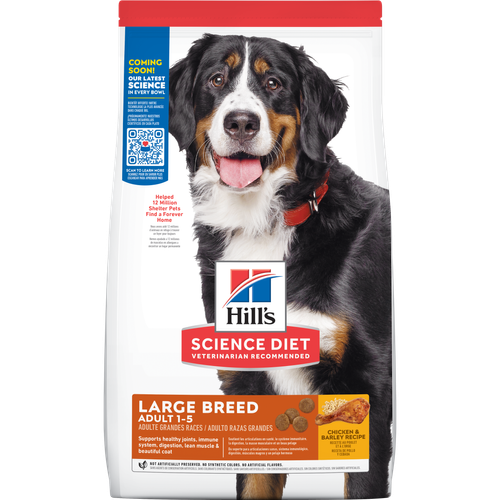
-
Find the right food for your petTake this quiz to see which food may be the best for your furry friend.Find the right food for your petTake this quiz to see which food may be the best for your furry friend.Featured products
 Puppy Large Breed Chicken & Brown Rice Recipe
Puppy Large Breed Chicken & Brown Rice RecipeVital nutrients to support 5 essential building blocks for lifelong health
Shop Now Adult Chicken & Barley Recipe Dog Food
Adult Chicken & Barley Recipe Dog FoodSupports lean muscle and beautiful coat for adult dogs
Shop Now Puppy Sensitive Stomach & Skin Salmon & Brown Rice Recipe
Puppy Sensitive Stomach & Skin Salmon & Brown Rice RecipeDelicious, highly digestible recipe, gentle on stomachs. Nourishes skin & promotes a lustrous coat
Shop NowFeatured products Adult 7+ Chicken Recipe Cat Food
Adult 7+ Chicken Recipe Cat FoodSupports energy level and beautiful fur in mature cats
Shop Now Kitten Chicken Recipe
Kitten Chicken RecipeVital nutrients to support 5 essential building blocks for lifelong health
Shop Now Adult Urinary Hairball Control Chicken & Rice Recipe Cat Food
Adult Urinary Hairball Control Chicken & Rice Recipe Cat FoodActively supports the health of the whole urinary system
Shop Now -
Dog
- Dog Tips & Articles
-
Health Category
- Weight
- Food & Environmental Sensitivities
- Urinary
- Digestive
- Joint
- Kidney
-
Life Stage
- Puppy Nutrition
- Adult Nutrition
- Senior Nutrition
Cat- Cat Tips & Articles
-
Health Category
- Weight
- Skin & Food Sensitivities
- Urinary
- Digestive
- Kidney
-
Life Stage
- Kitten Nutrition
- Adult Nutrition
Featured articles Pet Food Storage Tips
Pet Food Storage TipsDiscover how and where to store your dry, as well as canned, dog and cat food. Learn how to find the "best before" dates on all Hill's pet food packaging.
Read More Water
WaterDiscover why water is the most important nutrient for your dog or cat to live a healthy life. Find out how much water your pet should consume each day.
Read More The Incredible Science Behind Your Pet's Microbiome
The Incredible Science Behind Your Pet's MicrobiomeLearn what a pet's microbiome is, how it contributes to your pet's gut & overall health, and why nutrition is important in maintaining healthy microbiomes.
Read More -


Have you ever been told by your veterinarian that your dog needs to lose some weight? Some pet parents count the calories, cut out treats and increase exercise only to watch the scale move the wrong way. Just like in humans, a dog's metabolism can be too slow, sabotaging your weight loss efforts for your pup.
Wondering how your dog's metabolism works? Here are the basics of weight management for dogs.
The Metabolic Process
Metabolism is the body's complex process of converting food into usable energy. This process involves the interaction of the digestive system, the endocrine system, the muscles and the nervous system. Even if you are just sleeping or sitting on the couch watching TV, your body needs energy to power your ability to breathe, pump blood and digest. Did you know that 5 to 15 percent of the energy you expend every day, according to Discover Magazine, goes toward digesting the food you just ate?
The number of calories needed to power all these background functions is called the basal metabolic rate, or resting energy requirement. When you add in physical activity, the body's caloric requirement goes up. Your dog's metabolism works the same way.
Aging and Changes to Dog Metabolism
There are many factors that can affect a dog's metabolism. As dogs age, their amount of muscle mass tends to slowly decrease. If an older dog has osteoarthritis that makes it painful for them to walk or run, then he may exercise less, which can also contribute to muscle loss. Muscles are the main driver of metabolism — healthy, strong muscles are necessary to keep up a healthy metabolic rate. If a dog isn't burning as many calories, it then makes it easier for older dogs to pack on the pounds.
While obesity doesn't specifically lower a dog's metabolism, canine obesity is a big problem across the globe. According to the Association for Pet Obesity Prevention, 56 percent of U.S. dogs are overweight. Obesity combined with muscle loss can lead to a lowered metabolic rate that will require your vet's help to correct.
Other Factors
Dog metabolism can also be affected by hormonal disorders. Cushing's disease affects the pituitary and adrenal glands and causes elevated levels of the hormone cortisol, according to PetCareRx. Dogs with Cushing's disease tend to have an increased appetite and a lower metabolic rate, making it difficult to help them lose weight without treatment.
Hypothyroidism is another hormonal disorder that lowers the metabolic rate. Just like dogs with Cushing's, hypothyroid dogs tend to be overweight. Hypothyroid dogs, however, often gain weight despite having a regular or decreased appetite.
Genetics also plays a role in your dog's overall metabolic rate just as it does in humans. Dogs that are predisposed to slower metabolic rates will have a harder time burning off the calories that they intake, which means treats and table scraps can pack on serious pounds, possibly causing a host of other health concerns for your pup. Your dog's metabolic rate can simply be passed down from your dog's parent's similar to genetic diseases can. Genetics also are a factor when combined with your dog's breed. It's important to talk to your veterinarian to understand the weight level your dog should be at in order to know how to best maintain a healthy weight and metabolism.


Tasty Tips
The Role of Nutrition
Senior dogs, overweight dogs and dogs with hormonal conditions that negatively impact their metabolism can benefit greatly from tailored nutrition, including weight management dog food. A meal plan that is lower in calories and higher in fiber can help rev the metabolic engine. Restricting calories is important, but effective fat and weight loss still requires adequate nutrients for the maintenance of muscle tissues, healthy functioning of organs and to fuel the pet’s metabolism. It is important to work with a veterinarian to select the right weight management food and for customized feeding recommendations to help get your pet to an ideal body weight and healthy body composition. Your veterinarian can also help you work through problems that can arise during the weight loss journey such as begging and surfing the kitchen counter for snacks.
Proper nutrition (and not excess treats or human food snacks) combined with regular exercise is important to establishing a healthy metabolism in your dog. If you have tried all of the exercise and proper portion control and your pup is still struggling to get to a healthy weight, you might talk to your vet about a therapeutic dog food specially formulated to work with your dog's metabolism to keep them at a healthy weight.
A healthy body weight is one of the most important factors that determine your dog's longevity and quality of life. You can help them maintain a healthy metabolism with proper food, exercise and regular vet checkups. If you think your dog may have a sluggish metabolism, make an appointment to talk with your vet about ways to improve it. Your vet can identify any conditions that may be sabotaging your weight loss efforts and advise you on the best weight control regimen.


Dr. Sarah Wooten graduated from UC Davis School of Veterinary Medicine in 2002. A member of the American Society of Veterinary Journalists, Dr. Wooten divides her professional time between small animal practice in Greeley, Colorado, public speaking on associate issues, leadership, and client communication, and writing. She enjoys camping with her family, skiing, SCUBA, and participating in triathlons.
Related products

Supports lean muscle and beautiful coat for adult dogs

Delicious, highly digestible recipe, gentle on stomachs. Nourishes skin & promotes a lustrous coat

Supports healthy joints, lean muscle, and beautiful coat for large breed dogs

Vital nutrients to support 5 essential building blocks for lifelong health
Related articles

Proper nutrition for your pregnant or nursing dog is vital to her and her puppy's health. Learn what you should do provide her with the proper nutrients.

Large and giant breed puppies have different nutritional needs than other dogs. Learn how to provide the special care they need to grow up big and strong.

Understand the role that Omega-6 and Omega-3 fatty acids play in your dog's overall health, and how you can ensure they are getting enough.

Learn about Hill's puppy food and the nutritional benefit & high quality ingredients that it contains for your pup.

Put your dog on a diet without them knowing
Our low calorie formula helps you control your dog's weight. It's packed with high-quality protein for building lean muscles, and made with purposeful ingredients for a flavorful, nutritious meal. Clinically proven antioxidants, Vitamin C+E, help promote a healthy immune system.
Put your dog on a diet without them knowing
Our low calorie formula helps you control your dog's weight. It's packed with high-quality protein for building lean muscles, and made with purposeful ingredients for a flavorful, nutritious meal. Clinically proven antioxidants, Vitamin C+E, help promote a healthy immune system.

